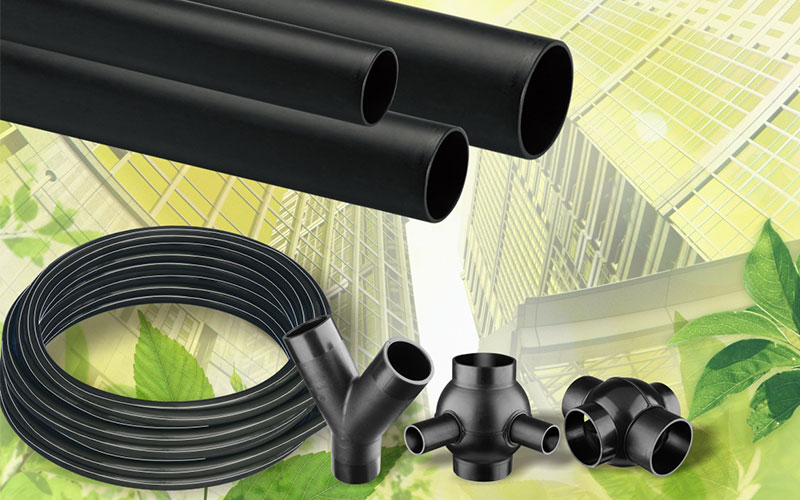American Plastics HDPE Pipe for Oilfield: Efficiency in Harsh Environments
Comprehending the Key Benefits of HDPE Pipe for Water and Wastewater Management
The use of HDPE pipe in water and wastewater management presents many benefits that merit factor to consider. Its extraordinary sturdiness and lengthy life-span make it a recommended option for lots of projects. Additionally, the product's resistance to deterioration and chemical damage improves its dependability in different environments. Nevertheless, the benefits expand beyond just long life and resistance. Exploring its cost-effectiveness and ecological impact discloses a lot more engaging reasons for its extensive fostering in modern-day infrastructure
Phenomenal Durability and Long Life

HDPE pipeline stands out for its extraordinary durability and longevity, making it a preferred choice in water administration systems. Constructed from high-density polyethylene, these pipelines can endure considerable pressure and anxiety, making certain trustworthy efficiency with time. Their robust nature enables them to sustain severe ecological problems, consisting of temperature level changes and soil movements, which can cause various other products to stop working.
The life expectancy of HDPE pipes usually goes beyond half a century, giving a cost-effective solution for municipalities and industries alike. Furthermore, the product's lightweight residential or commercial properties streamline setup, decreasing labor prices and timeframes. This resilience decreases the need for regular repairs or substitutes, additionally improving its economic allure.
In water administration applications, the dependability of HDPE pipelines implies fewer disturbances and improved solution continuity, making them essential to lasting facilities growth. The mix of durability and long life solidifies HDPE's role as a keystone in efficient water administration services.

Resistance to Rust and Chemical Damages
While numerous materials catch corrosion and chemical damages over time, HDPE pipelines show impressive resistance, making them excellent for different water administration applications. This resilience stems from the molecular structure of high-density polyethylene, which is naturally non-reactive and does not wear away like steels or degrade from exposure to harsh chemicals. As a result, HDPE is very effective in atmospheres with hostile materials, such as wastewater systems that might have acids, bases, and natural solvents.
Furthermore, HDPE pipes can endure ecological factors such as soil acidity and saline conditions, even more improving their suitability for diverse applications (American Plastics HDPE Pipe Manufacturing). Their capability to keep architectural stability gradually minimizes the threat of leakages and failings, which is essential in guaranteeing the safety and security and dependability of water distribution and wastewater monitoring systems. Consequently, the resistance to corrosion and chemical damage significantly contributes to the overall efficiency and durability of HDPE piping solutions
Cost-Effectiveness and Financial Benefits
When taking into consideration the monetary implications of water monitoring systems, the cost-effectiveness of HDPE pipes becomes evident. These pipelines offer reduced installation and upkeep prices contrasted to traditional materials like steel or concrete. Their lightweight nature simplifies transportation and setup, leading to minimized labor costs. view publisher site Additionally, HDPE pipelines show a lengthy life-span, usually surpassing half a century, which converts to less substitutes and long-lasting savings.
The resistance of HDPE to deterioration and chemical damages reduces the need for pricey repair services and replacements. The pipelines likewise support efficient water circulation, lowering power prices connected with pumping systems. By alleviating leakages and water loss, HDPE pipes contribute to substantial economic benefits for districts and industries alike. Generally, the first financial investment in HDPE piping can produce substantial economic returns over the life expectancy of the water management system, making it a sensible choice for lasting facilities development.
Ecological Sustainability and Decreased Influence

Convenience and Adaptability in Installation
As a result of their unique buildings, HDPE pipelines provide amazing flexibility and adaptability in installment, making them appropriate for a wide variety of applications. Their lightweight nature enables easier handling and transportation, lowering labor costs and installation time. HDPE pipes can be bent and formed to fit various terrains and job demands, which is specifically advantageous in challenging settings.
In addition, their resistance to corrosion and chemical damage permits setup in varied setups without the demand for specialized safety coatings. The capability to fuse joints produces a constant, leak-free system, improving the total honesty and reliability of the installation. HDPE's versatility additionally suits ground activity, decreasing the danger of damage in locations susceptible to changing soil. In general, these characteristics make HDPE pipelines not only functional however additionally a recommended choice for water and wastewater administration systems.
Regularly Asked Inquiries
How Does HDPE Pipe Compare to PVC in Water Monitoring Applications?
HDPE pipe supplies exceptional versatility, resistance to corrosion, and longevity compared to PVC. Its lighter weight helps with less complicated installation, while its underground water line long lifespan decreases replacement costs, making HDPE a favored selection in water monitoring applications.
What Is the Life-span of HDPE Pipeline Under Regular Problems?
Under typical problems, HDPE pipelines can have a lifespan ranging from 50 to 100 years. Their durability and resistance to corrosion add to their long-term performance in numerous applications, making them a dependable choice for framework.
Are HDPE Piping Recyclable After Their Life Span?
Yes, HDPE pipelines are recyclable after their service life. custom hdpe pipe manufacturing Midland TX. They can be processed and repurposed into brand-new products, considerably minimizing environmental influence and promoting sustainability within the sector, making them an environmentally friendly selection for piping remedies
What Is the Installment Process for HDPE Piping?
The setup process for HDPE pipes includes site preparation, trenching, pipeline blend or mechanical signing up with, backfilling, and pressure screening. Correct methods ensure a durable and effective system for transporting water and wastewater successfully.
Can HDPE Piping Be Used for Both Drinkable and Non-Potable Water Systems?
Yes, HDPE pipes can be utilized for both safe and clean and non-potable water systems. Their flexibility, longevity, and resistance to corrosion make them appropriate for numerous applications, ensuring risk-free and reliable transportation of water in different contexts.